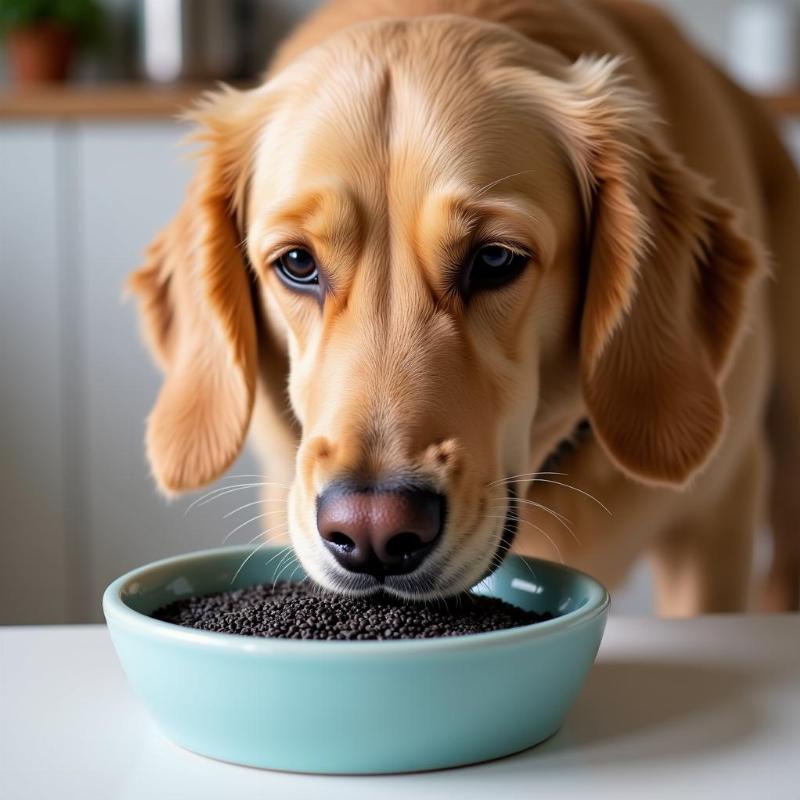Black sesame seeds are a popular ingredient in many human foods, adding a nutty flavor and a touch of visual appeal. But can our furry friends enjoy these tiny seeds too? The short answer is yes, dogs can eat black sesame seeds, but with some important caveats. Knowing the benefits, risks, and how to safely offer them is crucial for responsible pet owners.
The Nutritional Benefits of Black Sesame Seeds for Dogs
Black sesame seeds are packed with nutrients that can be beneficial for dogs, including healthy fats, fiber, antioxidants, and minerals like calcium, magnesium, and iron.  Chó ăn hạt mè đen The fiber in black sesame seeds can aid digestion, while the healthy fats contribute to a shiny coat and healthy skin. Antioxidants, like sesamol, can help protect cells from damage.
Chó ăn hạt mè đen The fiber in black sesame seeds can aid digestion, while the healthy fats contribute to a shiny coat and healthy skin. Antioxidants, like sesamol, can help protect cells from damage.
Potential Risks of Feeding Black Sesame Seeds to Dogs
While generally safe, too many black sesame seeds can cause digestive upset in dogs, such as diarrhea or vomiting. This is due to the high fat content, which can be overwhelming for a dog’s system in large quantities. Allergies, although rare, are also a possibility. Watch for signs like itching, hives, or facial swelling.
How Much Black Sesame is Safe for Dogs?
Moderation is key. A small sprinkle of black sesame seeds on their food a few times a week is generally considered safe. Start with a very small amount to see how your dog reacts. Always consult with your veterinarian before adding new foods to your dog’s diet, especially if they have any underlying health conditions.
How to Introduce Black Sesame Seeds to Your Dog’s Diet
The best way to introduce black sesame seeds is to start with a tiny amount, mixed in with their regular food. Observe your dog for any adverse reactions. If they seem to tolerate them well, you can gradually increase the amount, but always keep it within a reasonable limit.
Can Dogs Eat Sesame Oil?
While sesame seeds are okay in moderation, sesame oil should be avoided. It is much more concentrated and can be harder for a dog’s digestive system to handle, leading to more serious digestive problems.
What to Do if Your Dog Eats Too Many Black Sesame Seeds
If your dog ingests a large quantity of black sesame seeds and exhibits symptoms like vomiting, diarrhea, or lethargy, contact your veterinarian immediately. They can provide the appropriate guidance and treatment based on your dog’s specific needs.
Conclusion
Black sesame seeds can be a healthy and tasty addition to your dog’s diet when given in moderation. Remember to introduce them slowly, monitor for any reactions, and always consult your veterinarian with any concerns. By following these guidelines, you can safely share this nutritious treat with your furry companion.
FAQ
- Can puppies eat black sesame seeds? Yes, but in even smaller amounts than adult dogs and only after consulting with your veterinarian.
- Are white sesame seeds safe for dogs? Yes, white sesame seeds are also safe for dogs, with the same precautions as black sesame seeds.
- What are the signs of a sesame seed allergy in dogs? Itching, hives, facial swelling, and difficulty breathing are potential signs of an allergy.
- Can sesame seeds help with my dog’s coat? The healthy fats in sesame seeds can contribute to a healthy coat and skin.
- Should I grind sesame seeds before giving them to my dog? Grinding them can make them easier to digest.
- Can dogs eat sesame seed paste (tahini)? Tahini is generally not recommended for dogs due to its high fat content and potential for digestive upset.
- What other seeds are safe for dogs? Flaxseeds, chia seeds, and pumpkin seeds are generally considered safe for dogs in moderation.
Beautdogs.us is your premier resource for all things dog-related in the USA. We provide expert advice on dog breeds, care, and products to help you provide the best possible life for your furry companion. Whether you’re a seasoned dog owner or just starting out, Beautdogs.us is your trusted source for comprehensive and engaging information on dog companionship and care. Contact us at [email protected] or +1 501-555-7529 for any questions.